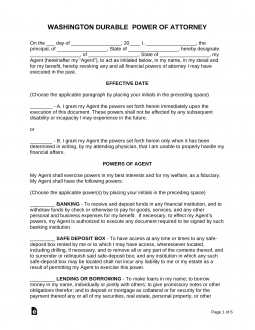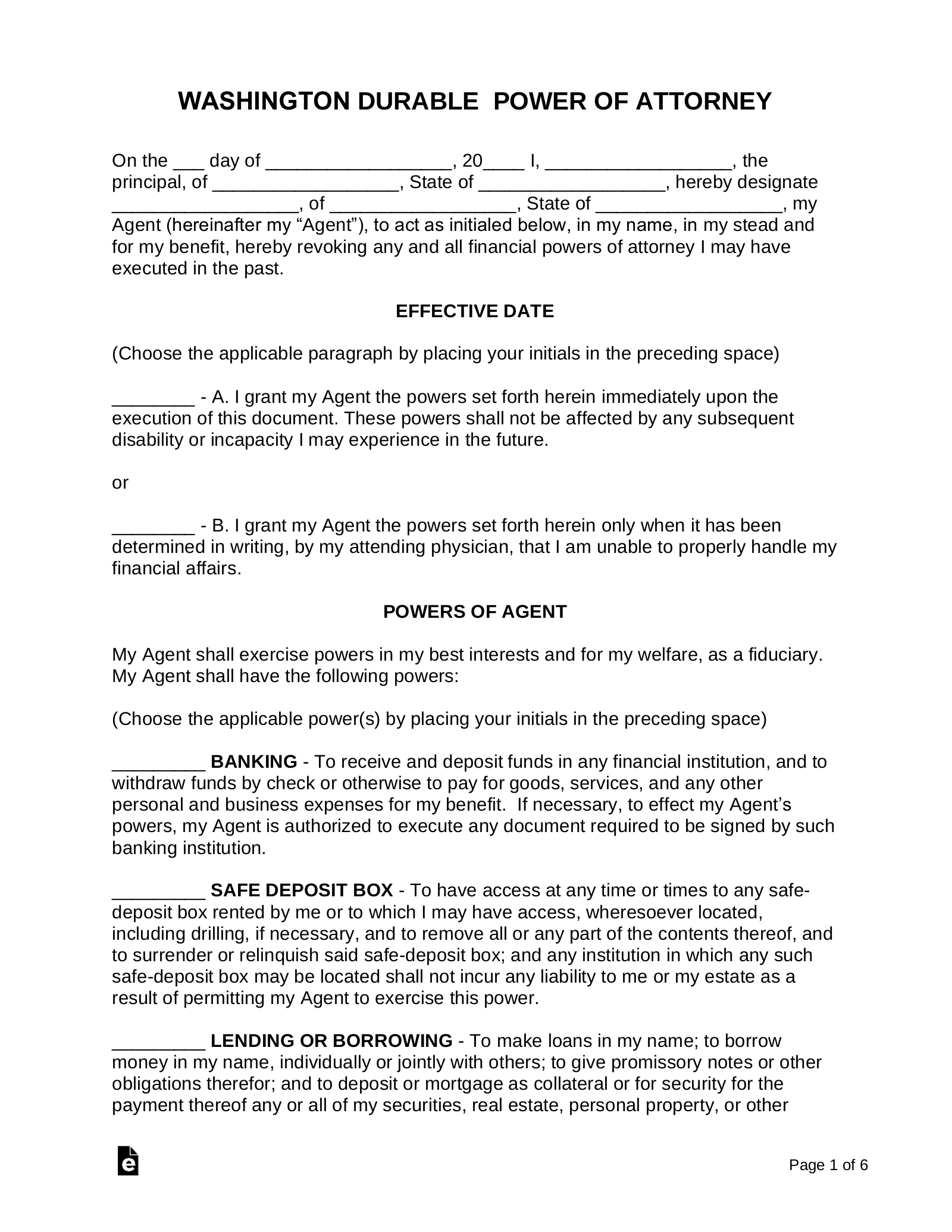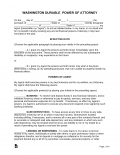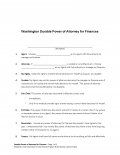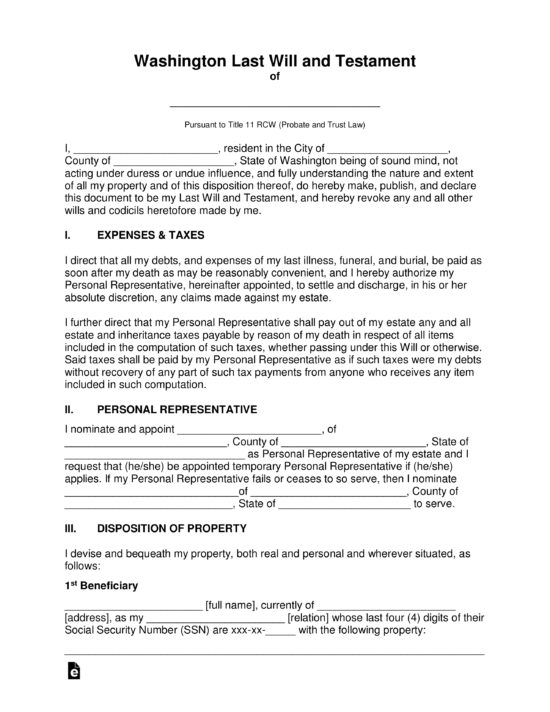Updated October 10, 2023
A Washington durable financial power of attorney form allows a person to designate another person to act as their agent and handle their financial affairs. The principal will need to complete the form, initialing the powers given to the agent, and upon completing will need to be acknowledged before a notary public. The agent will be able to act on behalf of the principal for the remainder of the principal’s lifetime unless revoked.
Table of Contents |
Versions (2)
Download: PDF, MS Word, OpenDocument
Northwest Justice Project Version
Download: PDF
Laws
Title 11, Chapter 11.125 (Uniform Power of Attorney Act)
Definition of “Durable”
“Durable,” with respect to a power of attorney, means not terminated by the principal’s incapacity (WA Rev Code § 11.125.020(2)).
Definition of Power of Attorney
“Power of attorney” means a writing that uses the term “power of attorney” and grants authority to an agent to act in the place of the principal (WA Rev Code § 11.125.020(7)).
Signing Requirements
The principal is required to sign in the presence of two (2) witnesses or a notary public. The agent has the option to complete the Agent Certification which requires signing in the presence of a notary public (RCW 11.125.050, RCW 11.125.430).
Statutory Form
There is no statutory durable power of attorney document in Washington, but language concerning durable powers can be found here: RCW 11.125.020.
How to Write
Download: PDF, MS Word, OpenDocument
Washington Principal Statement
(1) Document Date. The calendar date the Principal wishes associated with his or her appointment of power should introduce the declaration statement being made. Bear in mind this does not have to be the date when you, as the Washington Principal, wish the powers being appointed to be available to the Attorney-in-Fact.
(2) Declarant Or Principal. The declaration requires the Washington Principal to be fully identified. Thus, as the Washington Principal delegating your authority to an Attorney-in-Fact, record your full name.
(3) Principal Address.
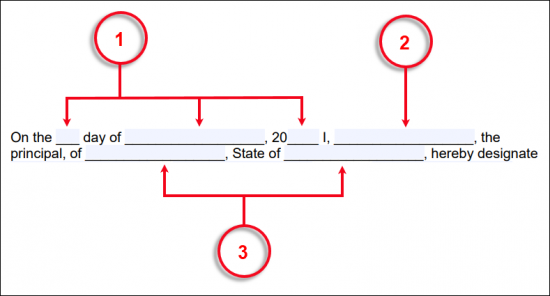
(4) Washington Agent. The Attorney-in-Fact to be granted the same powers you control (as the Principal) should be named along with the county or city and state this Agent resides in.
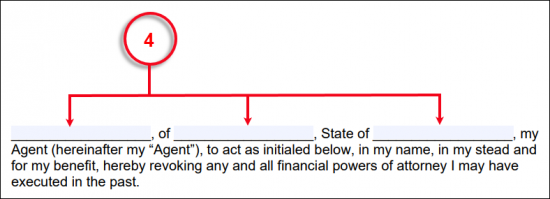
Effective Date
(5) Appointment Date. As the Washington Principal, you must decide when the authority you wish to delegate to the Agent goes into effect. This document allows these powers to become active as soon as you sign this paperwork, or they can be set to go in effect only at the time a Physician diagnoses you as incapacitated. This decision should be shown with your initials placed beside the appropriate statement.
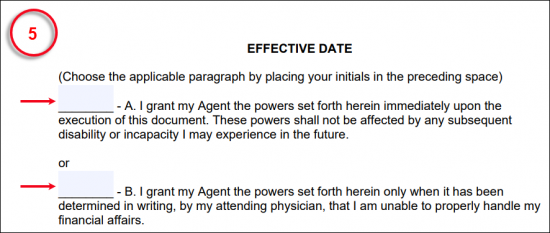
Powers Of Agent
(6) Banking. As with the timing of this document’s effect, you must determine in what matters you wish to grant the Attorney-in-Fact principal authority with. This will also need to be done by initialing the appropriate statement. A list of power definitions awaits review in this document. Initial a power statement if you have determined that the Attorney-in-Fact should be able to use your name to carry out its defined action. If for example, you wish the Attorney-in-Fact to act in your name with banking and financial institutions then initial the first power definition.
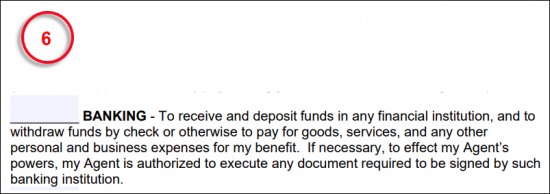
(7) Safe Deposit Box. The same access and control you have over your safe deposit boxes can be shared with the Attorney-in-Fact by initialing the second power statement displayed.
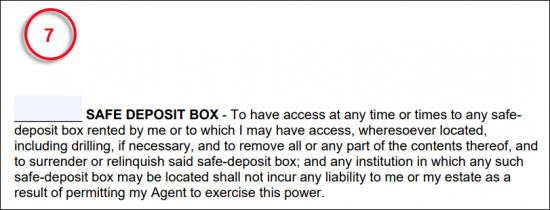
(8) Lending Or Borrowing. The ability to take out a loan/borrow money either individually or with others, the power to decide upon making loans, paying them, or negotiating them along with other similar actions can be granted to the Attorney-in-Fact if you desire. The third power statement will enable this grant of authority if you initial it.

(9) Government Benefits. You can approve of the Attorney-in-Fact’s use of principal power to deal with the government benefits that you currently use or may need to use. The ability to apply for government programs such as Social Security or Medicare in your name while you are incapacitated (or under your direction) can be granted to your Attorney-in-Fact when you initial this item from the power list.

(10) Retirement Plan. If you wish your Attorney-in-Fact to represent your interests over retirement plans and IRA’s under your control (excluding the right to affect your Beneficiary arrangements), then seek out and initial the appropriate power description.

(11) Taxes. In general, Entities concerned with taxation (i.e., the Internal Revenue Service, Department of Revenue, etc.) will expect their own paperwork to be completed so that your Attorney-in-Fact can perform certain actions on your behalf. However, the ability to access, work on, and complete certain tax forms or undertaking certain administrative actions in your name (to the extent this appointment allows) can be granted to your Washington Attorney-in-Fact by approving the sixth power description with your initials.

(12) Insurance. Your Attorney-in-Fact can be approved of handling decisions, payments, cancellations, and purchases of insurance policies such as home owner’s insurance or life insurance in your name by providing your initials of approval.

(13) Real Estate. Your ability to purchase real estate, exchange real property, lease, make credit arrangements and other powers in real estate currently under your control can be granted to the Attorney-in-Fact to carry out your directives in this area by initialing the power description provided.
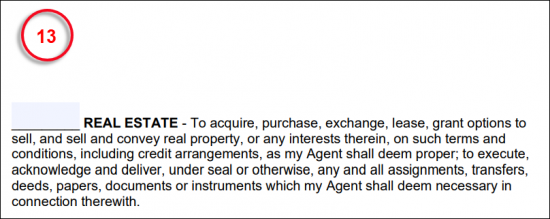
(14) Personal Property. If you have determined that the Attorney-in-Fact will be needed to perform actions with or for your personal property (i.e., automobiles, bonds, intellectual property, furniture, etc.) then your initials of authorization must be presented on the ninth power description.
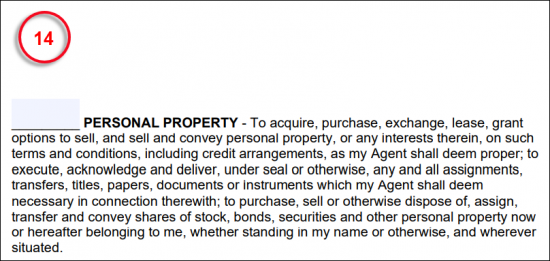
(15) Power To Manage Property. The Attorney-in-Fact can be granted the power to manage property in your name by engaging principal power to complete tasks such as performing or arranging form repairs, assessments, payments, or collections (depending on your role with that property). To give the Attorney-in-Fact such powers the tenth power definition requires your approving initials.
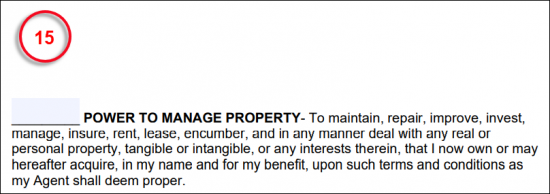
(16) Gifts. Your Washington Attorney-in-Fact can be set to arrange for gifts, honor charitable pledges, forgive debts, and other such actions in your name when the second to last item is supplied with your initials.
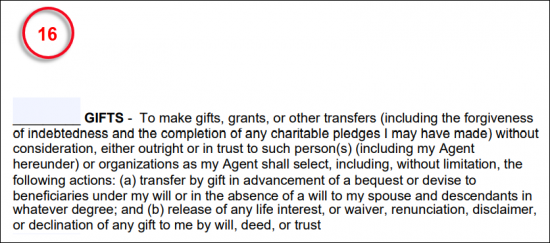
(17) Legal Advice And Proceedings. If you wish to grant the Attorney-in-Fact the power to handle legal administrative tasks and arrange or seek legal advice in your name, then initial the final power definition.

Special Instructions
(18) Principal Discussion. The language in this paperwork has been set to be compliant with Washington State’s current legal environment and statutes so only a general discussion of what your Attorney-in-Fact is able to do in your name is provided. This also means a wide scope of principal powers will be delivered. You can mitigate this broad use of power by delivering specific instructions to your Agent/Attorney-in-Fact and document any limitations to his or her use of principal power directly to the contents of this form. In fact, any such instructions or limitations you may wish imposed will not be considered part of this paperwork unless they are included as content or the title of an attachment with your wishes, preferences, instructions, and restrictions is cited and physically coupled with this paperwork.

Principal Acknowledgment
(19) Date Of Signing. Your signature date is required as proof of when this delegation of power was executed by you.
(20) Principal Signing. Your signature is mandatory for this document to be finalized and effective. You must provide it before two Witnesses and a Notary Public.
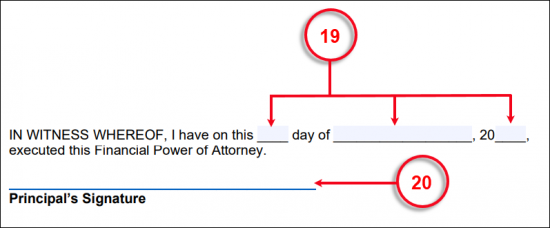
(21) Witness Statement. Two Witness signature lines are provided so that both Washington State Witnesses can produce a signature separate from the other to show agreement to the Witness statement provided. After signing, the Signature Witness must record his or her address.
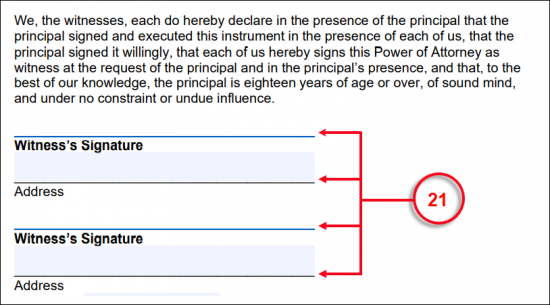
(22) Notarization. The Notary Public viewing the Washington signing will notarize your act of signing.
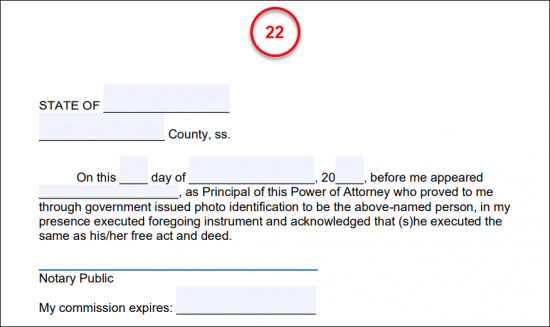
Agent’s Certification As To The Validity Of Power
(23) Acknowledgment Location. The state and county where the Attorney-in-Fact makes his or her statement of acceptance are required.

(24) Name Of Agent.
(25) Name Of Principal.
(26) Date Of Power Of Attorney. Record the date of your power of attorney (found in its introduction).
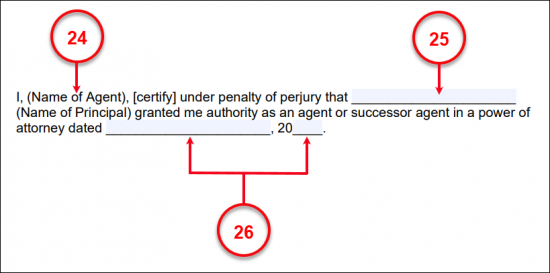
(27) Attorney-in-Fact Statement. Your Attorney-in-Fact may wish to make a statement. If so, you may review it in his or her certification area.

(28) Attorney-in-Fact’s Dated Signature. The Attorney-in-Fact should date and sign this area of the template in acknowledgment of the powers and responsibilities you are delegating.
(29) Attorney-in-Fact Name And Address. The printed name and current address of the Attorney-in-Fact should be displayed beneath his or her signature.
(30) Attorney-in-Fact Telephone Number.
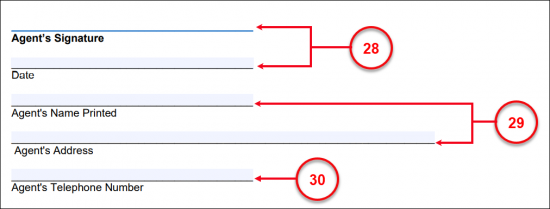
(31) Agent Signing Notarization. A notarization section accompanying the Agent’s signature is available for the use of the Notary Public viewing the Ohio Agent’s act of signing. This area should be completed by the attending Notary Public.

(32) Preparer Identity. If this form has been prepared for the Attorney-in-Fact’s signature by another Party, then this Preparer must identify himself or herself.

Related Forms
Download: PDF

